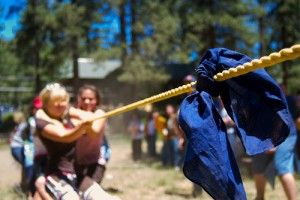
Source: Flickr / jphilipson
Several months ago I put out a call for postdocs applicants. Combined with other recruiting efforts, the lab has grown with several new positions — two postdocs (starting in the fall, and more upcoming interviews), our Scientific Outreach Program Manager, and an intern. And despite this growth, we need more.
My group has been pretty fortunate in the funding lottery, both in terms our independent research and collaborative projects. The challenge now of course is to execute on all that we’ve promised, and for that we need to continue to grow our amazing team. My last recruiting blog post was a general call for awesome people. That overarching criterion still applies, but I thought I’d also sketch out a few projects that might help people envision the type of project they might be working on. As is described on our research page, our activities can be broadly grouped in two areas (with two representative projects each):
Integrative Biology
- The microbiome and ulcerative colitis: The role of the microbiome in human health is perhaps most well-studied in the context of the gut flora. Commensal gut bacteria play an important role in metabolism, immune development, and protection from pathogenic infections. Not surprisingly, dysregulation of the gut microbiome have been directly linked to a variety of diseases, including ulcerative colitis (UC). In collaboration with Dennis Wolan’s lab, we are performing a metaproteomic study of the UC-associated gut microbiome, incorporating both a cross-sectional and longitudinal design (tracking changes through flares and subsequent control of symptoms). We are examining not just which bacterial species vary among these samples, but also what pathways are dysgegulated based on the proteomic signatures.
- Functional genomics of the immune system: In collaboration with the Salomon Lab, we are focused on understanding the molecular mechanisms underlying acute and chronic organ transplant rejection. These studies aim to unravel the mechanisms of action for current and new immunosuppressive drugs, and ultimately lead to the development and clinical translation of new molecular diagnostics for immune disease. Experimentally this work involves mRNA sequencing, miRNA sequencing, CpG methylation (bisulfiteDNAseq), whole exome sequencing, ChIPseq for multiple histone marks. Finally, an emerging area in this collaboration is studying the role of live microbes present in the tissue of rejecting transplants in tissue injury and immune activation.
Crowdsourcing Biology
- Community annotation through Wikidata: The Gene Wiki project is going strong. There are lots of metrics of success, but the one I love the most is that the 10,000 articles are viewed in aggregate more than four million times per month, clearly surpassing anything else I’ve ever had (or will ever have) a role in creating. But while the Gene Wiki is great for crowdsourcing a human-readable review article for a gene, it is not useful for crowdsourcing a computer-readable repository of gene annotations. (For example, it is impossible to query the Gene Wiki for all genes known to be involved in any neurological disorder and located on chromosome 17.) Wikidata is a relatively recent initiative that focuses on creating a community-maintained knowledgebase of structured data. We are in the process of extending our existing Gene Wiki / Wikipedia infrastructure to Wikidata, and we are confident that this new resource will have a similar impact as the Gene Wiki for the bioinformatics community.
- Bringing MyGene.info to the Semantic Web: MyGene.info is a set of high-performance web services that focus on querying and retrieving gene annotations. Our API receives over 3 million requests per month, providing easy programmatic access to 16 million genes from 14,000 species. MyGene.info is a useful resource for bioinformaticians worldwide. Now, we are focused on further increasing the utility of MyGene.info by integrating with Semantic Web standards. Currently, MyGene.info uses the common JSON standard as the data object format. Now, we are extending our services to utilize JSON-LD, an emerging standard for the Semantic Web. Completing this transition will enable MyGene.info to become an integral hub in a much larger network of Linked Data and to enable truly integrative queries across many distributed resources and domain areas.
If any of these projects (or our general research areas) sound remotely interesting to you, please get in touch!
(Just to be sure, I had to check the Wikipedia definition of motley crew. The part about having “characters of varied backgrounds and, usually to the benefit of the group, a wide array of methods for overcoming adversity” — that’s pretty spot on. “Pirates, Western posses, rag-tag mercenary bands, and freedom fighters” — not so much…)

Trackbacks/Pingbacks